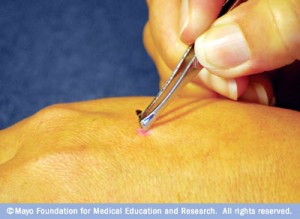READY TO GET STARTED?
REQUEST A FREE ESTIMATE
Fill out the form below or call (888) 466-7849 for a free, no-obligation estimate.
Yellow jackets have barbed like pointers on their stinger that cause the stinger to get lodged into the skin. The stinger is usually left behind, along with the venom sac. It is important to remove a stinger as quickly as possible because venom can continue to be released even if it’s not attached to the bee. The venom can cause an allergic reaction or a possible infection.

Source: Mayo Clinic
Symptoms of infection include:
Consult your Doctor immediately if any of these symptoms occur.
Symptoms of an allergic reaction include:
Consult your Doctor immediately at signs of an allergic reaction.
What to do if stung:
It’s very important to call a pest professional if you believe a yellow jacket nest is near your property. We DO NOT recommend you try to remove this on your own…this could result in being stung.
For yellow jacket removal, wasp removal, and hornet removal, call the professionals at Northwest Exterminating.
Other blogs: How to Treat a Yellow Jacket Sting
Disclaimer: These tips are general medical information and do not constitute medical advice. Please contact your physician for information about yourself or your family member.
Spring has arrived and brought pollen with it. Yesterday’s pollen count is the highest ever recorded in Atlanta for that date. According to Atlanta Allergy and Asthma Clinic, the record number was 9369 per cubic meter.
If you have springtime allergies you are probably having a tough time right now due to the extremely high pollen counts. Even people who do not normally have allergies can be having some difficulties with the pollen.
Symptoms include:
Tips To Avoid Pollen:
Treatment for Hay Fever Symptoms:
If you have a cough, wheezing or difficulty breathing, immediately call your doctor. For serious breathing problems call 911. You may be having a serious problem like an asthma attack. Treatment may include breathing treatments or steroids. You will definitely need to see your doctor if you are concerned about your cough or breathing.
In general, anti-histamines (like diphenhydramine, loratadine, cetirizine, and fexofenadine) are the first thing many people try because they decrease the allergic response. There are multiple over the counter preparations that work pretty well, but oftentimes one works better for one individual than another, and some have less side effects, like sedation, than others. There are prescription medications as well that your doctor can prescribe to you.
Decongestants help by relieving the inflammation and congestion that comes with the allergic response. Medications like pseudoephedrine and phenylephrine are available over the counter but can have serious side effects, so talk to your doctor or pharmacist before you begin taking them.
Steroids also decrease the inflammation related to allergies so they are used commonly if the anti-histamine or decongestants are not effective. Steroids are always prescribed by a physician or health care provider and cannot be obtained over the counter.
For itchy eyes (Allergic Conjunctivitis) there are many types of over the counter drops that work very well. One product has pheneramine (anti-histamine) and naphazoline (gets the red out). As with any medicine it can have side effects so contact your doctor if you are taking any other medications before you use it. Please discuss the treatment with your physician if you have any concerns.
Sneezing, runny nose, and congestion are symptoms of Allergic Rhinitis. There are many different preparations for this as well starting with decongestants which dry up your nose. Other preparations are steroid nasal sprays and medicines that stabilize the allergic response.
Enjoy Spring, but be careful if you are having allergic symptoms and call your doctor for any medical advice. CorrectMed Pediatrics can answer your questions and treat you if needed.
Thanks,
Dr. Goo